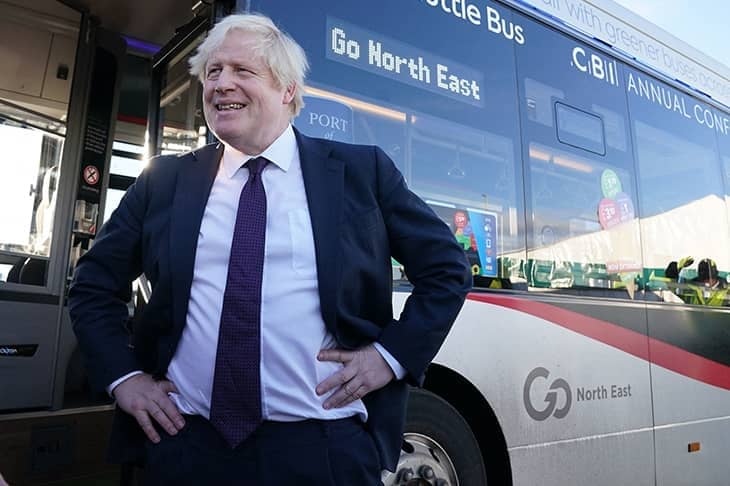Earlier this week, the Conservative party sent an appeal to its registered supporters asking them to become members. ‘We’re delivering what you voted for in 2019,’ it read. ‘So why not help us keep going?’ Unfortunately for Boris Johnson, there are now several answers to that question.
Two years ago, the Tories were re-elected on a promise to protect the public from the ever-rising cost of government. One of Johnson’s five pledges, personally signed by him, was not to raise taxation on ‘hard-working people’ and to stop any ‘jobs tax’. He has since changed his mind. In April, the Tory government will take a further 2.5 per cent of the salaries of those workers via National Insurance (i.e. a jobs tax). Half will be paid by employees, half by employers — but all of it will come out of people’s pockets, including those of the working poor.
As Lord Frost, the Brexit minister, pointed out in a magnificent speech to the Margaret Thatcher conference this week, this is the wrong road: high taxes make everyone poorer. Why leave the European Union only to mimic the high-tax, high-spend European social democratic model? The Tories are becoming the party that promise one thing during election time and do the opposite in government. The opinion polls suggest that voters are starting to notice.
Why leave the EU only to mimic the high-tax, high-spend European social democratic model?
The tax rise would perhaps be excusable if it was only intended to meet the costs of the pandemic. But its purpose is to embark on a new mission: to stop wealthier families paying for the cost of care homes. The main effect of this will not really be to provide better care; the extra money won’t add a single bed to the care-home system. What Johnson has designed is, in effect, a hugely expensive inheritance protection scheme for the asset-owning classes.
This week’s scrambled Commons vote, which saw the government’s majority cut to 26, was over a relatively small change to the Health and Care Bill, which proposes a lifetime cap of £86,000 on what any individual would have to pay towards their care. Under the Bill as originally published, some council funding would have contributed to the £86,000 cap. A government amendment, however, stipulates that the full £86,000 must come from an individual’s own pockets. As critics have pointed out, the reforms offer little to those with around £100,000 of assets, who still face losing the vast majority of their wealth to pay for their care.
But multimillionaires will be protected from having to shell out more than a small fraction of their wealth — and the biggest beneficiaries will be their heirs. Having promised in their 2019 manifesto that ‘nobody needing care should be forced to sell their home to pay for it’, the PM has had to concede that in some circumstances this might happen. About 25 per cent of pensioners now have household assets of £1 million or more. In 2008, this was just 7 per cent. The asset boom sent house prices into the stratosphere, creating an unexpected pool of wealth among the elderly — something that could and should now be used to pay for the cost of care.
It’s not clear why the Prime Minister expects Conservative supporters to applaud him while he implements the opposite of what he promised. On the campaign trail two years ago, he rightly warned about the ‘Cost of Corbyn’. Labour policies would, he said, cost £2,400 a year. We can now calculate the cost of Boris: in five years’ time, the tax burden will have increased by the equivalent of £3,500 per household, relative to when he took office.
The Prime Minister this week has been in trouble for messing up a Peppa Pig anecdote in his speech. But on Tuesday evening he gave a far better version of the speech to the same Margaret Thatcher conference that Lord Frost had addressed earlier. This speech unwittingly exposed the tension at the heart of Johnsonism. Peppa Pig, he said, is a great British intellectual-property export with two theme parks in China and many more around the globe. ‘No government in the world,’ he said, could create something as ingenious as Peppa.
He’s quite right. But for years the Tory government has been trying to do precisely this: with a ‘£60 million search’ (using taxpayers’ money) launched two years ago to find what the Department for Culture called ‘the next Peppa Pig’. It’s not right to accuse the Prime Minister of hypocrisy: this ‘Young Audiences Content Fund’ was not his creation. He may yet cut its funding and trust Britain’s thriving television industry to finance its own ideas. But his government looks dangerously unwilling to cut anything. It is branching into all kinds of things that it should not be doing and wasting staggering sums of taxpayers’ money in the process.
The Prime Minister remains his party’s greatest single election-winning asset — but he ought to remember what he promised people two years ago. His majority was the result of former Labour voters believing that he would be as good as his word. He delivered Brexit, but he also promised to protect people from the cost of government. It’s not too late for him to find ways to honour that pledge.






Comments